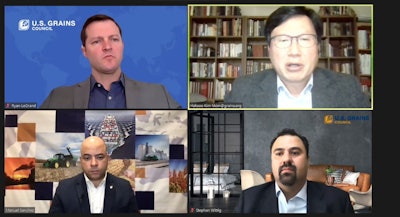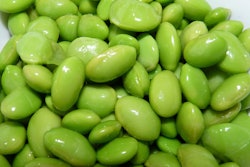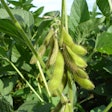
Members of the U.S. Grains Council (USGC) gathered virtually Monday for the first day of the organization’s 18th International Marketing Conference and 61st Annual Membership Meeting and began to set their sights on post-pandemic market development strategies for 2021.
“While the specter of COVID-19 is not something we ever want to repeat, the lesson it has taught us is that we are resilient and relentless in our pursuit of meeting our mission of developing markets, enabling trade and improving lives,” said USGC Chairman Jim Raben, an Illinois farmer.
Monday's speakers addressed more than 360 attendees and focused on the trade landscape and future of global grain markets post-pandemic.
Jack Bobo, CEO of Futurity, a food foresight company, highlighted future trends in the ag landscape and spoke about what the global economy may look like as the world emerges from the pandemic.
“Crises like COVID-19 encourage us to think about the present when we should really be thinking about the future,” Bobo said. “Understanding consumer trends and attitudes are critical to getting ahead of the trends. It’s not enough just to respond; we want to be prepared for the problem. We need to seek voices of clarity and have a very clear vision of what we want the future to be like, but we need to be flexible in how we get there.”
Shawn Marie Jarosz, founder and chief strategist of the consultancy TradeMoves, shared trade trends, export strategies and some headwinds and tailwinds to watch related to future grain market access and sales.
“We’ve seen a steady increase of exports leading to a peak in 2018, and we have about $135 billion worth of U.S. agricultural exports going to trading partners around the world. Nearly 300,000 U.S. jobs are linked to U.S. grain exports. But there are hurdles including tariff and non-tariff barriers. Around the world, it’s a race to see who can get the lowest tariffs, and we’ve got some work to do in the United States.”
Jarosz also highlighted the role of the World Trade Organization (WTO), saying "it’s important for the agricultural community to show support for it. We have to rebuild trust in the WTO because it’s the heart of trade. It’s about a reset. The U.S. must be a leader and come back into the fold.”
The kickoff speakers were followed by a panel of USGC’s international directors including Stephan Wittig, USGC director in Mexico, Haksoo Kim, USGC director in South Korea, and Manuel Sanchez, USGC regional director in Southeast Asia, who spoke with USGC President and CEO Ryan LeGrand about how they continue to reach out to grains, co-product and ethanol customers during the pandemic.
“As you are aware, just like yours didn’t there at home, USGC’s work didn’t stop last March. The pandemic forced us all to shift our thinking and engage differently in our markets around the world,” LeGrand said. “It’s vital to consider where the markets are headed, especially given what we are learning about how the coronavirus is impacting the markets around the world.”
While the pandemic offered each market different challenges, the international directors agreed that moving to virtual platforms also had some positive side effects.
Kim reported that 80 percent of USGC programming has still gone ahead despite the restrictions of COVID-19. Still, he said there were challenges and opportunities both with the new operating environment.
“It’s more difficult to get key staff to meet in-person sometimes, but going virtual allows some of those who wouldn’t otherwise have the time to get on a plane to attend a virtual meeting instead," Kim said. "The biggest advantage of virtual programs is that this has brought an expansion of customers.”
Wittig agreed, saying he was impressed how quickly people made the switch to virtual and how USGC staff has continued to work with grains stakeholders.
"We’ve found in Mexico that this process has actually built even more trust between USGC and its customers," he said.
Sanchez reported positive shifts in ethanol policies in Indonesia, Vietnam and the Philippines and a new aquaculture trial already yielding groundbreaking data on high-protein distiller’s grains with solubles (DDGS) in Indonesia.
“Our markets are resilient and our customers trust us," he said. "One of my biggest takeaways is that while other groups left the region during COVID, we rolled up our sleeves and stayed in the market, and they appreciated that. It’s made our relationship even stronger and I predict the best is yet to come.”
USGC's conference continues Tuesday and Wednesday to include a total of nine hours of USGC Advisory Team (A-Team) meetings, which also began Monday.
On Wednesday, longtime USGC producer members and staff will be recognized for their years of service during the Board of Delegates meeting, where A-Team leaders and sector directors will offer their recommendations and set USGC priorities for the coming year.
In addition, USGC will recognize posthumously Floyd Gaibler, USGC director of trade policy and biotechnology, for his contributions to USGC’s ongoing work. The audience will also hear from Missouri Corn Growers Association and Missouri Corn Merchandizing Council’s retiring CEO Gary Marshall, recognizing him for his decades-long involvement with USGC.

















